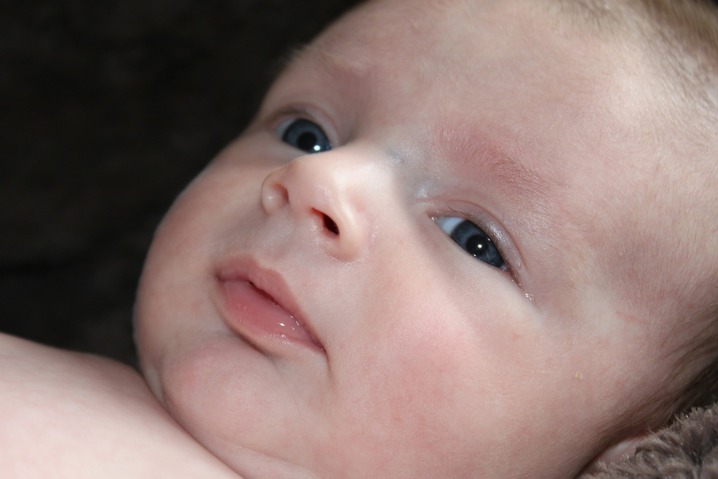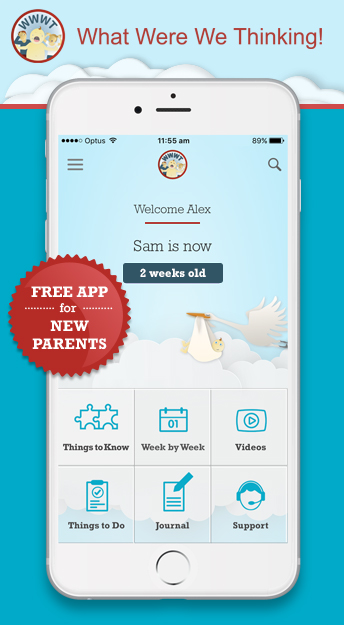The 'tie' between breastfeeding and my shredded nipples
By Danielle

Who knew I would ever speak out, let alone begin a blog post, by talking so openly about my nipples?! But unfortunately this is where our story begins. A story I feel I need to share as it’s one experienced by many yet not often spoken about – tongue and lip ties in newborns.
In the first three days of Oliver’s life, his constant feeding led to my nipples’ near demise. I looked down to see open bleeding wounds, an absolute shock, and looking back I’m not sure what was more painful – my C-section wound or my shredded nipples!
I spent a fair bit of time seeking advice from breastfeeding experts in the hospital’s lactation room. “Am I doing this correctly?” I’d ask. “You’ve got a great supply, you’re doing a wonderful job!” they’d say. I would leave the room feeling guilty for almost flooding with milk, while other new mums struggled with their supply, and still always felt like something wasn’t quite right. Breastfeeding or expressing was so incredibly painful that I couldn't even have anything brush past my chest without wincing with pain. I was told it wasn’t going to be easy, but surely it shouldn’t be this hard, I thought to myself.
On leaving hospital I sought the guidance of a lactation consultant and she too seemed to think my breastfeeding technique was fine. Looking into Oliver’s mouth, however, she concluded he had a tongue and lip tie.
This was why he was nipple feeding. No matter how I many times I attempted to get a better latch, he would readjust himself or otherwise refuse to feed. He would gag and take in air when I tried bottle feeding him, so despite knowing what I knew, once my nipple wounds had healed it was straight back to the breast. I’ll admit it, I was scared and it felt like some sort of torture. I’d take in a deep breath every time he latched and then literally stamped my feet through the pain of most breastfeeds as the pain was so unbearable.
The lactation consultant wrote a referral letter to a paediatric dentist who specialised in performing laser frenotomy, but at just 8 days old I was so traumatised by the thought of a laser cutting through the skin in my tiny newborn’s mouth that I convinced myself it just wasn't necessary. At the same time, I couldn't seem to get the idea out of my mind and began researching and reading every bit of lingual frenulum material I could get my hands on, my husband nearly going mad when I shared with him a new interesting fact!
Oliver demanded to be breastfed every two hours and never seemed satisfied. In between feeds he could not relax if I lay him down, so I needed to cradle him, walk up and down our hall or wear him in a sling on me practically ALL day. With the frequent feeding came a buildup of gas, which made the poor little guy even more uncomfortable, and so the vicious cycle continued.
Thankfully, my nipples slowly became accustomed to the breastfeeding-a-tongue-tied-baby-battlefield and while it was still uncomfortable, it wasn’t nearly as painful as in those early weeks. Although my nipples were survivors, I personally still felt like a captive of the house. Oliver would immediately scream if I attempted to take him out in the pram, or out for a drive. I dreamt of fresh air, sunshine and just getting out (even to the supermarket!) I felt like my sanity depended on it, and yet venturing out was such an ordeal that I regretted it nearly every time.
Once I got my head around everything to do with tongue and lip ties, I decided we should be brave and go ahead with laser correction. When the day finally came, there was no backing out and I tried desperately to put on a brave face. I looked so forlorn that the doctor asked me to wait outside … outside the building! I sat on the steps and cried. I wanted to support my baby but the doctor insisted it was better if I wasn’t present. It was over in minutes and I rushed inside to cradle my baby. He was understandably shaken and upset but he breastfed straight away which was an immediate relief for both of us.
Thankfully the trauma of going through the procedure was well and truly worth it. While the post-operative treatment that followed was unpleasant, the second day after the procedure we saw remarkable improvements. Oliver was able to achieve a deep latch and suddenly had the suction of a vacuum! His feed times reduced, he slept longer at night and after some persistent settling he finally slept in his cot during the day.
I feel like it’s important to put our story out there, as I am surprised that health professionals didn’t diagnose and intervene earlier, despite witnessing the trouble and trauma we were all going through. The impact of these ties is so significant – I’m surprised it’s not checked off like any other routine tests they perform post birth. If there is anyone else out there who is experiencing what we went through, it’s definitely worth having bubs assessed for ties.
If you’re like me, and your bub has been diagnosed but you feel extremely confronted by it all, I found a support group for tongue and lip ties which you may also find comfort in. What I found from this group is that there are thousands of other parents, all around Australia, with the same symptoms we were experiencing; babies with terrible gas build-ups, extreme poonamis, reflux, general irritability and often being inconsolable. The story of others may help you feel less overwhelmed, and I’m hoping that mine will too.
As for us now? The decision to laser Oliver’s ties was an absolute life changer. Oliver became a much happier baby and I, in turn, had an overwhelming sense of relief. The cloud of anxiety that had built up over those months is gone and being able to finally venture outside on drives and walks makes me feel like, at last, freedom is ours!
Expert response from What Were We Thinking! expert, Ann O'Doherty
Thanks for your post Danielle and for raising an issue that is often not common knowledge. Tongue ties and lip ties contribute to significant feeding issues and a lot of distress for both the mother and baby as you have clearly experienced.
There is nothing quite as painful as damaged nipples and we know that tongue-ties can be associated with infant distress, reduced intake of milk, lower weight gain and problems for the mum including reduced milk supply and nipple damage with associated blocked ducts and mastitis.
Breastfeeding, even without a tongue or lip tie, can take time to establish. Both you and your baby are learning as you go and a lot of us need support and help to do this.
Some babies with tongue and lip ties are able to suck effectively from the breast or a bottle of expressed breast milk or formula, but those with complex ties can have difficulty managing any sucking action and definitely need assessment and support quickly. We know from research that if a baby does have a tongue tie that affects the function of the tongue, then the release of that tongue tie (by a procedure called a Frenotomy) is safe and generally effective.
Tongue and lip ties, also known as Ankyloglossia (tight frenulum), may not always be recognised. The accurate assessment of tongue and lip ties is a specialty practice and a particular art.
Some babies have tongue and lip ties and are able to feed well, not damaging their mother’s nipples. In some babies, the frenulum under the tongue is obviously tight creating a heart shaped appearance to the tip of the tongue. Parents can see this heart shape and will often notice that their baby is unable to poke their tongue out past their lower lip or raise their tongue towards the roof of their mouth.
In some cases though, the tongue tie is buried deep at the base of the tongue and may not be seen or felt with diagnosis elusive until a lactation consultant or paediatrician assesses the function (how the tongue moves forward, side to side and upwards). Upper lip ties can be subtle and effect feeding by preventing the upper lip from flaring out enough to allow for good attachment. Occasionally with feeding issues, where the answer is not clear, you may find your Maternal and Child Health Nurse referring you to see a speech therapist to assess the motor function of your baby’s mouth, jaw and tongue.
I think the take home message here, and this reflects your experience as well Danielle, is that if any mum is experiencing pain with breastfeeding (especially if that pain is associated with nipple damage or your baby is having issues with gaining weight and sucking at the breast) getting a referral to a lactation consultant sooner rather than later is important.
Most public hospitals that provide birthing services will have access to lactation consultants at no cost. Women can request to see a lactation consultant while still in hospital or attend public breastfeeding clinics after they have been discharged home. Private birthing hospitals will have access to lactation consultants as well and there are lactation consultants in private practice too
A Maternal and Child Health Nurse should be able to provide further assistance regarding where to go for help from lactation consultants and the names and addresses of doctors who can assess for and treat tongue and lip ties. Lip ties are generally treated by specialty paediatric dentists or through the Royal Children’s Hospital in Melbourne.
Support groups, as you highlighted, are a great idea. Talking to other parents who have experienced similar issues can help us know where to go, what to do and things to look out for.
As parents, we always want the best for our babies and as in your case, when the information you received initially about breastfeeding didn’t address your needs, you took the initiative to look further until you found the answers you needed. Well done!
Posted in: Baby 0-4 weeks Crying settling sleeping Growth and development Mums Your needs








